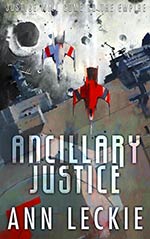
![]() attackofthebooks
attackofthebooks
4/29/2014
![]()
Before I opened Ancillary Justice and started reading, I had heard rumors that it was something quite different from anything I had ever read. I remember reading a review late last year, and the reviewer promised that the effect was nothing short of mind-blowing.
And perhaps it is. To be sure, within a few pages I was impressed with Ann Leckie's inventive, or innovative, way of spinning the story.
Told from the perspective of a former soldier of a wide-reaching space empire, Ancillary Justice brings a literary touch to the space opera genre without giving up what it means to be science fiction. Breq is the last unit of a massive starship, cut off by an artificial intelligence at war with itself. Once a single mind with a legion of bodies, she has been left with a single human body and a quest to wreck revenge on the perpetrator of her ship's doom.
To call Ancillary Justice different from anything I've read before would be a disservice, but also speaks to my inability to find a suitable comparison. Leckie keeps the pace careful and at times slower than I generally enjoy, but the plotting feels deliberate and suggestive of a noir at times. The language itself is the clue to the reader, sparse at times, even, suggesting more than it shows or tells, and leaving the reader to imply or guess.
In this sense, as much as Ancillary Justice left me fascinated and curious--and indeed, I've spent some time in the period since I finished it thinking about and wondering what exactly the book is and intends to be--the novel is lacking a certain sense of edge and drive. Leckie has no problem crafting the situations that raise the tenor of the plot, but often fails to raise the reader's pulse. Even when danger is imminent, the scene progresses with a sense of detachment that belies the action.
Not surprisingly, the novel is up for a Hugo and deservedly so. Leckie's novel dwells not just on what it means to be human, but also touches on economics, foreign policy, espionage, and more. Unfortunately, whether it gets the Hugo will depend largely on the disappointing politics that have raged around the Hugo nominations this year. That's not to say that I think Ancillary Justice deserves it--I also have great respect for other nominations, as well--but more to say that I think it is unlikely that votes cast will be relative to the novel's merits rather than in response to the politics around the nomination.
And that's too bad.
It's taken me a long while to review Ancillary Justice (I finished it back in December of 2013), even though I've recommended it on occasion and even loaned out my copy, as well. It's because the book did well what I look for in a novel: it both made me think and entertained me. However, I am equivocal about it. The novel has much to like about it, but there are places that feel incomplete or unfinished, or perhaps like they need to be fleshed out a little more.
Whether Leckie gets the Hugo or not, Ancillary Justice is a quality piece of fiction that you should read. Pick it up before the Hugo is announced in August, and let me know what you think.
http://www.attackofthebooks.com/hugo-nominee-book-review-ancillary-justice-by-ann-leckie/